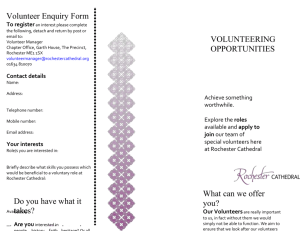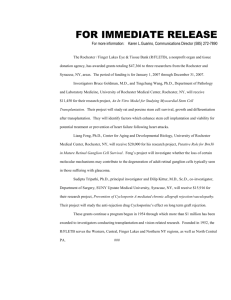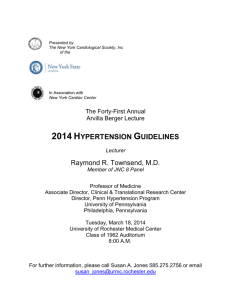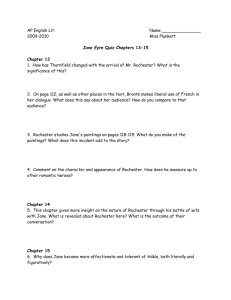Divergence - University of Pennsylvania
advertisement
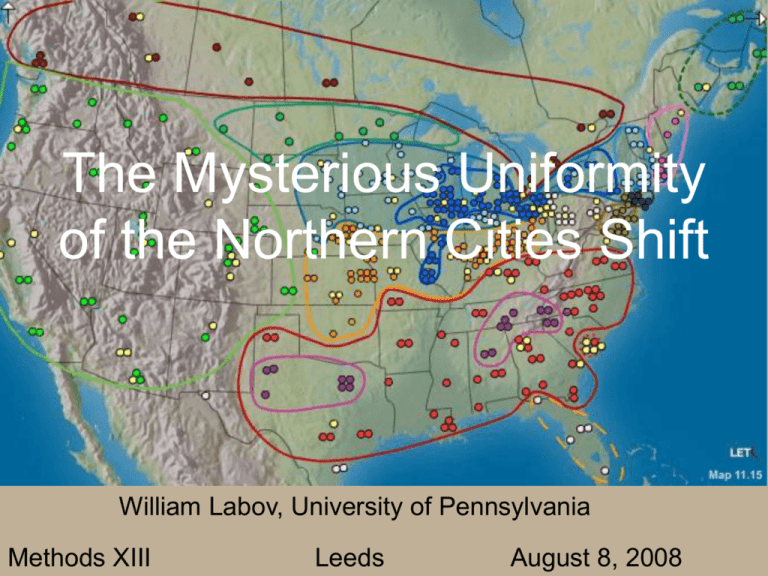
The Mysterious Uniformity of the Northern Cities Shift William Labov, University of Pennsylvania Methods XIII Leeds August 8, 2008 William Labov Home Page www.ling.upenn.edu/~labov Some substantial differences in dialectology New World Old World Time Depth 200 years 2000 years Spatial range 3000 mile 500 miiles Major tendency Divergence Dialect leveling Variables Phonological Phonological/Morphological, Level of awareness Low High The trajectory of this inquiry into the mysterious uniformity of the Northern Cities Shift 1. The discovery of the NCS in several Northern cities. 2. The triggering event of the NCS in western New York state. 3. The westward expansion to the Inland North. 4. Differentiation of the NCS by social class and gender. 5. The uniformity of the NCS throughout the Inland North. 6. Ideological background from settlement history. 7. Modern day reflections. . . The Northern Cities Shift in Chicago Experiments on Cross-Dialectal Comprehension, 1989 Word Phrase Sentence 1 . ______ _____________ ___________________ 2. ______ _____________ ___________________ 3. ______ _____________ ___________________ 4. ______ _____________ ___________________ The Northern Cities Shift desk mat busses head boss block socks The Telsur Project • designed to obtain a comprehensive view of the phonological changes in progress in the English of North America • a telephone survey of all cities of population 50,000 and over • names chosen from local telephone directories, concentrating on major ethnic groups of that city • first 2 subjects who were locally born and raised accepted as representative of that city (4 to 6 in the largest cities) • 762 speakers interviewed representing 325 cities, most 1992-1999 conversation on local developments elicitation of particular words perception and production of minimal pairs semantic differential: e.g., what’s the difference between a bag and a sack? • acoustic analyses of systems of 439 speakers, 130,000 vowels • provided data for the Atlas of North American English, (Berlin: Mouton/degruyter, 2006. Rochester, New York Rochester Extended sample of speech from Sharon K., 35, Rochester, TS 359 Sharon K. is an advanced speaker of the Northern Cities Shift. Listen for the raising and fronting of short a in Catholic, adding, taxes, fact fronting of short /o/ in modeling, lot backing of short /e/ in send, went, sending fronting of /ay/ in nine backing of /i/ in tuition Yeah, well I send my kids to private school, but--across the street from me is a Catholic school, y’know I send ‘em there. I went there, in fact I live in the house that I grew up in. We’re re-modeling right now, uh adding on to the family room, and doing the work. We-we like the neighborhood, and we feel very comfortable here. We like all the neighbors, y’know, neighbors I’ve known since I was nine. Bishop Parity behind us, but I don’t know if we’re gonna be sending him there. The tuition could be very expensive. As it is now, we’re paying a lot for public. . .Y’know we pay a lot of--taxes are very high here. Vowel system of Sharon K., Rochester Northern Cities Shift of Sharon K., 35[1995], Rochester NY, TS 359 KIT STRUT TRAP DRESS THOUGHT LOT Northern Cities Shift in the vowel system of April S., 20, Rochester NY, TS360 KIT STRUT TRAP THOUGHT DRESS LOT Where did the Rochester accent come from? Migration to the Rochester area Kniffen and Glassie 1966, Fig. 7 Community movement Mass migrations were indeed congenial to the Puritan tradition. Whole parishes, parson and all, had sometimes migrated from Old England. Lois Kimball Mathews mentioned 22 colonies in Illinois alone, all of which originated in New England or in New York, most of them planted between 1830 and 1840. --Richard L. Power, Planting Corn Belt Culture: The Impress of the Upland Southerner and Yankee in the old Northwest, 1953. P. 14. Cities on the Erie Canal The impact of the Erie Canal The impact on the rest of the State can be seen by looking at a modern map. With the exception of Binghamton and Elmira, every major city in New York falls along the trade route established by the Erie Canal, from New York City to Albany, through Schenectady, Utica and Syracuse, to Rochester and Buffalo. Nearly 80% of upstate New York's population lives within a 25 miles of the Erie Canal. The Erie Canal: A Brief History No established village had ever mushroomed so rapidly [as Rochester], growing from 1507 to 9207 within a ten year span Blake McKelvey, A Panoramic View of Rochester History. Rochester History 11:2-24. Growth of population along the Erie Canal Erie canal The TRAP vowel in the speech of immigrants to western New York State Nasal short-a system of Diane S., 37, Providence, RI Continuous short-a system of Jesse M., 57[1996], New Britain CT, TS465 Broad-a system of Denise L., 21 [1995], Boston MA, TS 427 Split short-a system of Nina B., 62 [1996], New York City, TS 495 Input of short-a systems to cities on the Erie Canal, 1817-1825 nasal (WNE) broad (Boston) QuickTime™ and a TIFF (LZW) decompressor are needed to see this picture. continuous (SWNE) split (NYC) General raising of /æ/ for Sharon K., 35 [1995], Rochester, NY, TS 359 Westward expansion --A. Wexler. Atlas of Westward Expansion. NY: Facts on File, 1995. p. 64 Rochester Detroit The Northern Cities Shift of Sabrina K., 37 [1994], Detroit MI, TS 176 KIT STRUT TRAP DRESS THOUGHT LOT Social variation Gender and social category determination of five elements of the Northern City Shift in a Detroit suburban high school Male Jocks 70 Male Burnouts Percent advanced tokens 60 Female Jocks Female Burnouts 50 40 30 20 10 0 œ æ TRAP o LOT oh e THOUGHT DRESS ^U STRUT Source: Eckert 2000 Further westward settlement Settlement patterns shown by diffusion of building methods from seaboard nuclei --Kniffen & Glassie 1966. Fig. 27 The North/Midland lexical isogloss Coincidence of the North/Midland lexical line and NCS isoglosses Measures of the development of the Northern Cities Shift Four measures of the progress of the Northern Cities Shift Means of six Northern Cities Shift vowels in the speech of Sharon K., Rochester EQ: /æ/ higher and backer than /e/ AE1: /æ/ < 700 Hz ED: F2(e) - F2(o) < 375 Hz UD: /^/ back of /o/ NCS vowels in the system of a Midland speaker, Mimi P., 31 45 [2000], Indianapolis IN, TS 775 F1 EQ: /e/ higher than /æ/ 700 UD: /^/ front of /o/ AE1: /æ/ > 700 Hz ED: F2(e) - F2(o) > 375 (523 Hz) The Northern Cities Shift AE1 measure: raising of /æ/ to F1 < 700 Hz. The Northern Cities Shift EQ measure reversal of relative positions of /e/ and /æ/ The Northern Cities Shift ED measure: front-back alignment of /e/ and /o/ The Northern Cities Shift UD measure: /^/ backer than /o/ The Inland North U.S. at Night Grand Milwaukee Syracuse Rochester Rapids Chicago Flint Buffalo Detroit Kenoshat Cleveland Joliet Toledo Do current patterns of the communication flow contribute to the uniformity of the Inland North? Relationships among America’s Most Populous Metropolitan Areas North/Midland boundary Fridland’s view of African-American participation in the weakening of /ay/ in Memphis Tie, tied and tIght: the expansion of /ay/ monophthongization in African-American and European-American speech in Memphis, Tennessee. Journal of Sociolinguistics 7:279-298, 2000. Social correlates of four measures of the Northern Cities Shift [N=71] Age Female Years of 25 yrs Gender Education AE1 34* EQ 34* ED 112*** UD 37 8.6* 26* *** P < .001, * P < .05 H.S. -68* -16* Yankee cultural imperialism and the Northern Cities Shift Settlement patterns of four regional cultures Yankee Virginia Quaker Upland South Settlement Towns Plantations villages Farm Isolated clusters House location Roadside Setback Cornerclusters Creek & spring Internal migration Low Moderate High Very high Persistence 75-96% 50-75% 40-60% 25-40% David Hackett Fisher, Albion’s Seed, p. 814 An ideological opposition dividing the Inland North from the Midland ...among the new arrivals to Jefferson [County, Indiana] was a species of settler strikingly different in outlook from small southern [upland] farmers. . . these newcomers not only displayed a disgusting predilection for self-improvement schemes but were also fond of pointing out out their virtues to those who took life at a less feverish pace. It was the Yankees who were described as yearning to constitute a social and cultural elite that would sponsor and support higher education, literary societies, and lecture courses, and follow their inclination to regulate the morals of the whole society. --Richard L. Power, Planting Corn Belt Culture: The Impress of the Upland Southerner and Yankee in the old Northwest, 1953 The meddling Yankee Taxed with being busybodies and meddlars, apologists own that the instinct for meddling, as divine as that of selfreservation, runs in the Yankee blood; that the typical New Englander was entirely unable, when there were wrongs to be corrected, to mind his own business. --Richard L. Power, Planting Corn Belt Culture: The Impress of the Upland Southerner and Yankee in the old Northwest, 1953, P. 6. The Yankee perspective One of the most distinguishing features of the Yankees of the 19th century had been their confidence that theirs was a superior vision and that America’s future depended on their ability to impose their order on the life of the nation. . . They established thousands of public schools and private colleges, filled churches and lodge halls with committed believers, and codified their version of morality in the statute books. --Morain, Thomas J. 1988. Prairie Grass Roots: An Iowa Small Town in the Early Twentieth century. Ames, IA: Iowa State University Press. P. 256 Correcting Midland speech patterns At Greensburg in southeastern Indiana, the Reverend J. R. Wheelock advised his eastern sponsors that his wife had opened a school of 20 or 30 scholars in which she would use “the most approved N.E. school books,” to be obtained by a local merchant from Philadelphia. “She makes defining a distinct branch of study and this gives her a very favorable oppy. of correcting the children & thro’ them, the parents of ‘a heap’ of Kentuckyisms.” --Richard L. Power, Planting Corn Belt Culture: The Impress of the Upland Southerner and Yankee in the old Northwest, 1953, P. 114. Tim Frazer, “The language of Yankee Cultural Imperialism” ...we must learn what led to the establishment of Inland Northern as a prestige dialect in the Great Lakes region; we need to understand as well why scholars like Kenyon, George Phillip Krapp and Hans Kurath...embraced the concept of Inland Northern as a General American.” Perhaps the language of “Yankee cultural imperialism” was appropriate for a century of corporate expansion, leveraged buyouts, and American military intervention in the Philippines, Central America, the Caribbean, Vietnam, and the Middle East. from “Heartland” English., ed. T. Frazer, U. of Alabama Pres, 1993.Pp. 60, 66. Yankee ideology and American reform movements Imbued with the notion that their was a superior vision, Yankees dutifully accepted their responsibility for the moral and intellectual life of the nation and set about to do what needed to be done, with or without an invitation from the uneducated, the undisciplined, the disinterested, or the unmotivated Cultural uplift Yankee style also meant attacking sin and sloth. The initial settlement of Iowa coincided with three very active decades for American reform movements. Health fads, prison reform, women’s rights, crusades for new standards of dress---the northern states teemed with advocates of one cause or another. Most important among the reform movements of the day were the issues of abolition and temperance. Morain, Thomas J. 1988. Prairie Grass Roots: An Iowa Small Town in the Early Twentieth century. The Henry A. Wallace Series on Agricltural History and Rural Studies. Ames, IA: Iowa State University Press. Election 2004 results by state 1973-1982: Restoration of the death penalty after Furman 1972. States with no death penalty and the Northern dialect area An experimental approach to the ideological correlates of Inland North and Midland speech Passage 1 in Experiment 1 (from Sabrina K., 37, Detroit MI, TS 176) • short o fronting • short a raising • oh lowering The--the way I got hired for this one job was really weird, ‘cause I went in for a . . . secretarial position is what I went in for, and they had hired. . .ah-somebody else that didn’t know anything, but it was a buyer’s daughter, so then she got the job. And uh-they called me because I had done shipping and receiving as far as--the paper work, and they had asked me if I‘d help out ‘cause their--shipper had just had a heart attack and she wasn’ comin’ back for a while. The Northern Cities Shift of Sabrina K., 37 [1994], Detroit MI, TS 176 KIT STRUT TRAP DRESS THOUGHT LOT Passage 2 in Experiment 1 (from Mimi P., 45 [2000], Indianapolis IN, TS 775) •short o back of center •tense a before nasals; lax a, e in that •aw fronting • ^ fronting I read, a-n-nd like most women, I like to go shopping and play card games with family and friends and that kind of thing, nothing really exciting. We used to go camping quite a bit on the weekends, but our lives have shifted enough that we don’t do that much right now, but uh that’s what we do. N S means of Mimi P., 45 [2000], Indianapolis IN, TS 775 KIT DRESS STRUT TRAP THOUGHT LOT Cities assigned to Detroit and Indianapolis speakers by student listeners at Indiana University [N=90] Speaker assigned to Chicago Detroit Michigan Cleveland Minneapolis Fort Wayne, So. Bend Indianapolis Indiana Other Midland Ky, Tn Atlanta Denver Total Dialect Inland North Inland North Inland North Inland North North Transitional Midland Midland Midland Upper South South West Sabrina K.. 24 26 5 1 2 4 6 3 1 1 1 74 Mimi P. 3 4 24 4 3 12 1 51 Political opinions ascribed to an Inland North (Detroit) and Midland (Indianapolis) speaker by students at U. of Indiana, Bloomington [N=90] Abortion Affirmative action Gun control 3.5 Approval -> 3.7 3.9 Inland North Midland 4.1 4.3 4.5 p < .03 p < .003 4.7 No significant difference in judgments of intelligence, trustworthiness, education; Midland speaker judged more friendly (p < .00001) Structural constraints and driving forces General principles of chain shifting 1. Tense vowels rise along the peripheral track. 2. Lax nuclei fall along the nonperipheral track 3. Back vowels move to the front The Northern Cities Shift bit i 6 1 bet e 4 but 5 oh caught 3 æ cat o 2 cot An image of the swimmer in the bay. . . does the Australian crawl, the breast stroke, backstroke, the butterfly, back to the crawl again and thinks to himself, “I am really making this current move!” The mysterious uniformity of the Inland North does not eliminate social variation is the structural base on which social variation is built is itself the product of social forces larger than local identity that we are only beginning to understand

![The progress of the Northern Cities Shift in the Inland North [N=71]](http://s2.studylib.net/store/data/005278121_1-6c7b61110e83fce2e7b3ab15c9a37e24-300x300.png)
